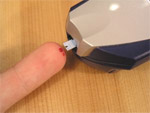April 4, 2011
 Measuring the levels of inflammatory proteins in the blood, combined with certain clinical features, can aid in the diagnosis of Alzheimer’s disease, according to a new report from the Texas Alzheimer’s Research Consortium. A blood test for Alzheimer’s that detects the disease at an early stage could be a boon for helping to managing the disease, since treatments may be most effective early on in the disease process.
Measuring the levels of inflammatory proteins in the blood, combined with certain clinical features, can aid in the diagnosis of Alzheimer’s disease, according to a new report from the Texas Alzheimer’s Research Consortium. A blood test for Alzheimer’s that detects the disease at an early stage could be a boon for helping to managing the disease, since treatments may be most effective early on in the disease process.
Scientists now believe that Alzheimer’s may begin to damage the brain decades before memory loss and other symptoms become prominent. Definitive diagnosis can be made only after death, by studying the brain at autopsy. Early diagnosis could be especially helpful in testing new drugs, since they may help prevent deterioration of the brain before damage becomes extensive.
“There is clearly a need for reliable and valid diagnostic and prognostic biomarkers of Alzheimer’s disease,” the authors wrote, “and in recent years, there has been an explosive increase of effort aimed at identifying such markers.”
Scientists are studying a number of ways to detect Alzheimer’s at an earlier stage. They include brain scans to look for physical changes that may be indicative of Alzheimer’s, as well as spinal taps to measure proteins in the spinal fluid that may be characteristic of the disease. An accurate blood test, which could be done easily in a doctor’s office or clinic, would be an easier and more efficient way to measure the progress of the disease.
In the current study, published in the medical journal Archives of Neurology, researchers from Texas Tech University Health Sciences Center in Lubbock analyzed proteins in the serum of 197 patients diagnosed with Alzheimer’s. They measured levels of various proteins, including fibrinogen, which is involved in blood clotting; interleukin-10, an immune system chemical; and C-reaction protein, which is a marker for inflammation. They compared their results with 203 age-matched peers who did not have Alzheimer’s.
Using these measures, they were able to identify Alzheimer’s in 80 percent of those with the disease. They also excluded Alzheimer’s in more than 90 percent of those who were mentally intact.
Their predictive accuracy improved when they combined the blood test markers with other risk factors, like the person’s age, sex, education levels, and whether they carried the APOE-E4 gene, which raises the risk of developing Alzheimer’s. Using these clinical measures, they identified Alzheimer’s in 94 percent of those with the disease, and excluded it in 84 percent of healthy control.
While a test that is 100 percent accurate would be ideal, the findings show that scientists are growing closer at identifying Alzheimer’s at ever-earlier stages using standard laboratory tests. “The identification of blood-based biomarker profiles with good diagnostic accuracy would have a profound impact worldwide and requires further validation,” the authors concluded.
By ALZinfo.org, The Alzheimer’s Information Site. Reviewed by William J. Netzer, Ph.D., Fisher Center for Alzheimer’s Research Foundation at The Rockefeller University.
Source:
Sid E. O’Bryant; Guanghua Xiao; Robert Barber; Joan Reisch; Rachelle Doody; Thomas Fairchild; Perrie Adams; Steven Waring; Ramon Diaz-Arrastia; for the Texas Alzheimer’s Research Consortium: “A Serum Protein–Based Algorithm for the Detection of Alzheimer Disease.” Archives of Neurology, Sept. 2010; Vol. 67 (No. 9): pages 1077-1081.












